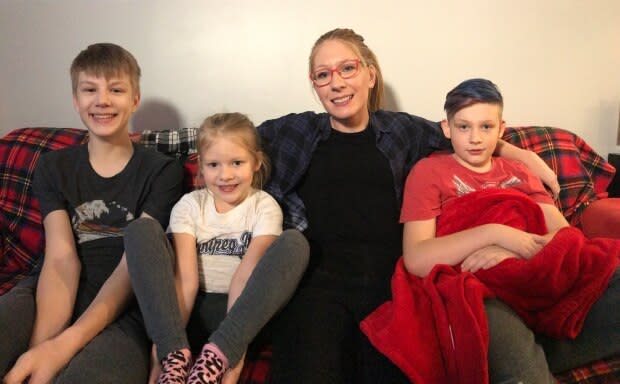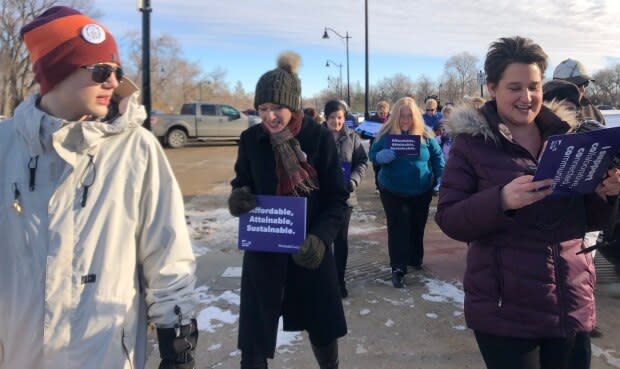End of co-operative rental subsidies could displace 200 Sask. families, advocates say
Tonya O'Keefe worries she might lose her home and business if the Saskatchewan government ends rental assistance programs for co-operative housing.
O'Keefe has lived at Rainbow Housing Co-op in Saskatoon for 10 years.
Through a partnership with the province, some residents have subsidized rent and pay roughly 30 per cent of their income, rather than the usual full rental amount. That program allowed O'Keefe and her family to find housing at the co-operative.
"Money was really tight," said O'Keefe. "I was going to the food bank and putting a little bit of water in the milk to make it go a little bit longer."
The single mother of three was on social assistance at the time. Then, she started a daycare out of her home.
Within two years, her business grew to the point that she was able to go off of assistance. Two years after that, she was able to pay rent without a subsidy.

O'Keefe said co-operatives like the one she lives in are made up of all different kinds of people, with varying incomes. When she was struggling, she said the community rallied around her and inspired her to create a better life for herself and her family.
One neighbour even gave her free cooking lessons and would drop off boxes of groceries once a month.
Knowing that she had "a safe place to live and a good community," she says, she found "inspiration to want more for myself and for my kids."
"When you put somebody in the right environment to grow, then they're going to grow," said O'Keefe, "and they want to give back to the community and they want to pass that along.
"And I I really believe that that's what we do here."
25-year partnership agreements ending
O'Keefe's mother was diagnosed with cancer a year ago. O'Keefe downsized her daycare so that she could take her mom to appointments.
Now living on a lower income, she once again relies on subsidized rent and says without it, she wouldn't be able to stay at Rainbow.
But soon, that option might be off the table.
Twenty-five-year partnerships between the province and co-operatives are now starting to end, and the province isn't renewing them.

Maria Vaiaso, the vice-president of the Co-operative Housing Association of Saskatchewan, said the end of the agreements is likely to displace about 200 households, including vulnerable seniors, people with disabilities and single-parent families, like O'Keefe's.
"It's really disheartening," said Vaiaso. "The people that live here, this is not just a place where they live, this is their community. Their friends are here. The community gardens are here.
"We've had members who have lived here for 25 years."
Agreements won't be renewed: minister
The housing association held a protest in front of the legislature on Wednesday afternoon. More than 1,000 people signed a petition asking the government to renew the agreements. It was tabled by the NDP before question period.
Paul Merriman, the province's minister of social services, said the agreements were intended to run during each co-operative's 25-year-mortgage and will not be renewed.

"Those mortgages are now getting to the point where they are paid off in full and the subsidy does drop off once the mortgage is paid because there is no expense coming off on their side," Merriman said. "We've sat down with them and made sure that if there is any transitional issues we would help them on that."
He told CBC he encouraged co-operatives to take on more residents who can subsidize rent than residents who require subsidies, so that the communities can be self-sustaining.
Merriman said five co-ops now subsidize their low-income residents themselves.
A spokesperson for Rainbow Housing said it won't be able to do that.
O'Keefe said her family will have to move back into a subsidized Saskatoon Housing Authority building, most likely in a different area of the city.
She said her eldest son, 13-year-old Gabriel, is doing well in school, but she fears he will be ripped out of his peer group just in time for his first year of high school. All his sports teams are also made up of kids from his current neighbourhood.
"I'd have to change schools and all my friends would go because I wouldn't be able to talk to them. I'd have to leave the community behind," Gabriel said, tearing up.
"I wouldn't go to the same church. I wouldn't go to the same high school, and it sucks to think about it."
Merriman said there are still about 600 low-income rental units available through the Saskatchewan Housing Corporation in Regina and Saskatoon for those in need.


